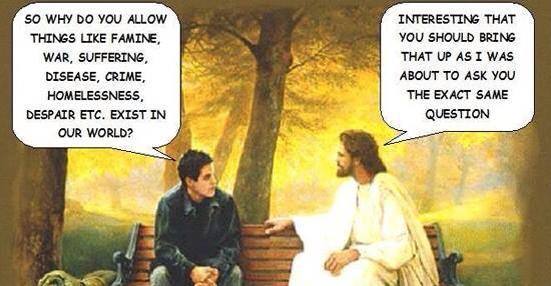

Christian And Theological Existentialism
Existentialism and God: Most of the 20th century French Existentialists (Camus, Sartre etc.) were agnostics, and for the most part Existentialism is a "modern" philosophy in the sense that it is based on Enlightenment Rationalism and works in accord with modern philosophy and science: we should only believe that which can be proven thru empirical evidence and scientific "proof"; it is unwise to believe that which lies beyond or seemingly contradicts such evidence. In contrast to modern, rational philosophy, faith is the belief in that which cannot be proven (See Hebrews 11:1).
However, the Christian Soren Kierkegaard (1813-1855) is considered the father of Existentialism (and he defined nearly all of Camus and Sartre's themes) still permeated modern Christian theology, and there have been some notable, important Christian Existentialists.
Free Will and The Leap Of Faith: The Christian Existentialist philosopher Karl Jaspers: (1883-1969) argued that the concept of Free Will makes all Faith essentially (pun intended) Existential: that one is ultimately free to choose or not choose faith, or, for that matter, which or what faith to choose from: you must choose whether to be a Catholic, or a Baptist, or a Hindu, or a Muslim, or an atheist. Ultimately, you and you alone are responsible for this choice.
Jaspers also argued all faith is a "leap" beyond reason -- thus the phrase "leap of faith" (often mistakenly attributed to Kierkegaard). In this way, faith itself is absurd -- it is a point at which we move beyond reason and thus enter thoughts that do not rationally make sense. But Existential philosophy argues life itself does not make sense (death renders existence itself "absurd"), so confronting the absurdity of life with the absurdity of faith makes a kind of absurd sense (this is the kind of "absurd" logic Camus is referring to when he calls Sisyphus the "absurd hero".). If that makes sense. Neo leaps!
It is the atheist Nietzsche, ironically, who pointed out that believing that scientific rationality will make us happier is itself irrational: why assume that grasping the rational truth of a situation will improve your life? This being true, an irrational response to an irrational universe may be as 'rational' a choice as any other.
Thus, in Begrebet Angest (The Concept of Dread) (1844), Kierkegaard (a Lutheran) examined the only appropriate emotional response to the condition of human freedom. Anxiety (Ger. Angst) is the dizziness produced in any reasonable being who stands at the brink of genuine freedom. Knowing that we can think and do as we will naturally inspires deep fear about what we shall think and do.
Even religious verities, Kierkegaard supposed, offer no lasting relief from the predicament. Christianity (as Paul had pointed out) makes no sense; its genius lies not in any appeal to the dictates of reason but rather in its total reliance on faith. But from our point of view, the content of an authoritative command is entirely irrelevant; all that matters is the claim that the command places upon our lives. There can be no proof of the authority behind the command, since any such demonstration of its value would make it impossible for us to accept it as a matter of faith.” (This section from: http://www.philosophypages.com/hy/5t.htm#dread)
Left To Interpret Signs: As Sartre points out in Existentialism is a Humanism, even once you have made this initial choice, the believer/theist is still "left to interpret signs," in for all practical purposes the same way the atheist must: simply believing in a God will not tell you how to make many of the most important choices you must make as you will your life into meaning; it will not tell you who to marry, for example, where to live, which career to choose, or even when to support or not support war. Recall, for example, that the worst war in American history was fought by Christians against Christians over the issue of slavery.
Christians, Muslims and Jews all trace their morality back to the Mosaic Laws/Ten Commandments, and yet there is very little agreement on what the four simple words "Thou shalt not kill" mean, when carried out in our real lives. When is it ok to kill and when is it not ok? Regardless of our faith, we seem left to interpret these signs.
Reinhold Niebuhr (1892-1971): Though largely forgotten today, this American, Protestant, Existential theologian was cited by both Barack Obama and John McCain as "highly influential" (Obama called Niebuhr his "favorite philosopher"). More importantly, Martin Luther King cites him as an important influence, most notably in his "Letter From Birmingham Jail". Niebuhr was also the head of Union Seminary (NY) when Tom's father -- who majored in philosophy as an undergrad -- attended Union, and so it's probably worth throwing out to the class that my own interest in Existentialism, and its relationship both to Christian theology and to the Holocaust, is linked back to this man.